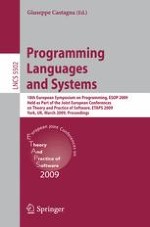2009 | Buch
Programming Languages and Systems
18th European Symposium on Programming, ESOP 2009, Held as Part of the Joint European Conferences on Theory and Practice of Software, ETAPS 2009, York, UK, March 22-29, 2009. Proceedings
herausgegeben von: Giuseppe Castagna
Verlag: Springer Berlin Heidelberg
Buchreihe : Lecture Notes in Computer Science
